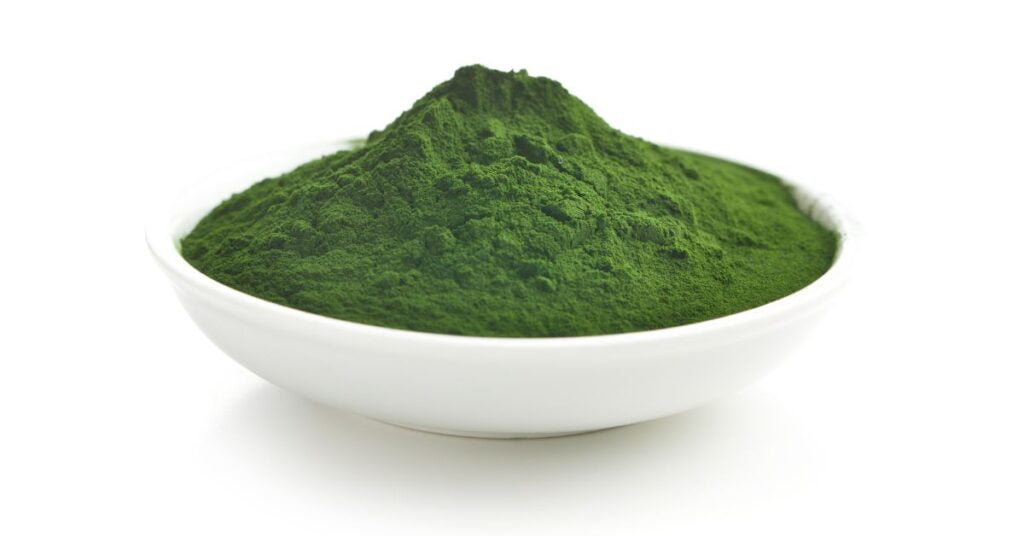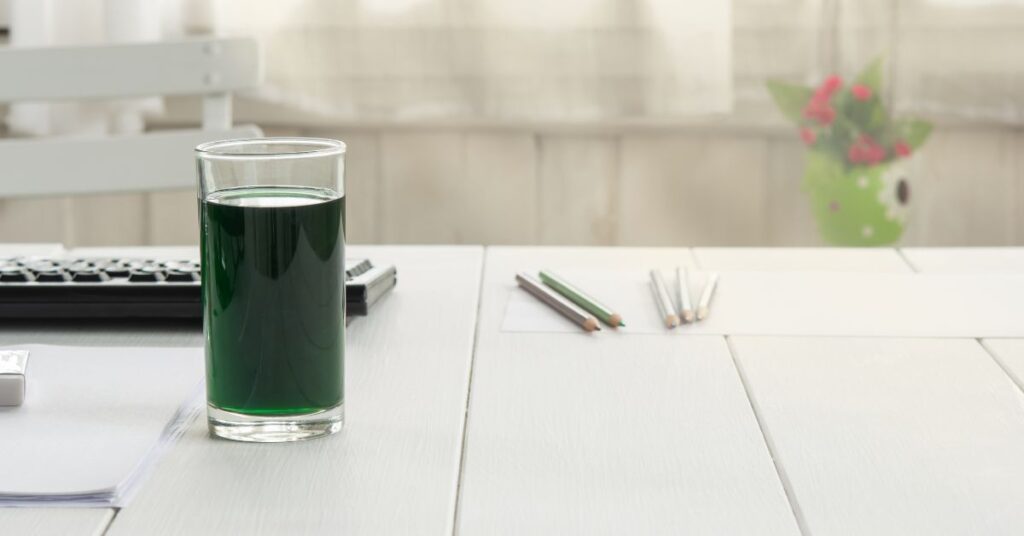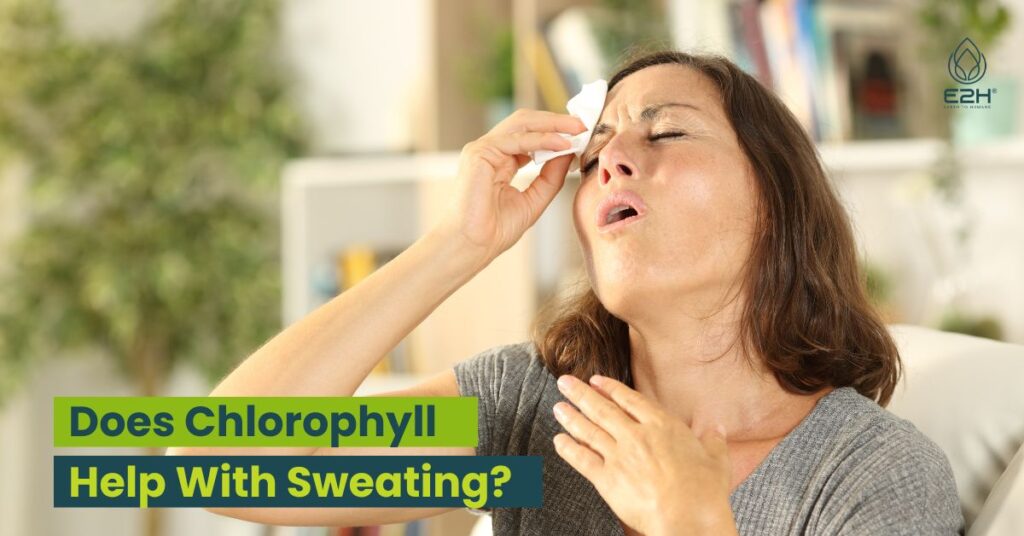While the relationship between chlorophyll and sweating is not fully understood, some studies suggest that chlorophyll may help to reduce body odor associated with sweating. Incorporating chlorophyll-rich foods or supplements into your diet may be a natural and safe way to potentially reduce sweating-related body odor.
What is Sweating?
Sweating is the body’s natural process of producing and releasing fluids, primarily water and salt, through the sweat glands. Sweating helps to regulate body temperature, cool the body during exercise or in hot environments, and remove toxins from the body. Sweating is a normal and necessary bodily function that helps to promote healing maintain overall health and well-being.
What is Chlorophyll?
Chlorophyll is a green pigment found in plants and algae that is responsible for absorbing light energy from the sun and converting it into usable energy through photosynthesis. It is rich in antioxidants and has been studied for its potential health benefits, including improving digestion, for weight loss boosting immunity, and reducing body odor associated with sweating. Incorporating chlorophyll-rich foods or supplements into your diet may be a natural and safe way to potentially improve overall health and wellness throughout life.

Does chlorophyll help with sweating?
While the relationship between chlorophyll and sweating is not fully understood, some studies suggest that chlorophyll may help to reduce body odor associated with sweating. The human body has two types of sweat gland, eccrine and apocrine sweat glands. Eccrine sweat glands are found all over the body and produce a watery sweat that helps to regulate body temperature, while apocrine sweat gland are primarily found in the armpits and groin area and produce a thicker, more odor-prone sweat.
Research has shown that chlorophyll may help to reduce body and skin odor associated with apocrine sweat gland activity. Chlorophyll works by reducing the production of odor causing bacteria in the sweat gland ducts, leading to a reduction in body and skin odor. Additionally, chlorophyll has been shown to have natural deodorizing properties that help to mask unpleasant body and skin odors too.
While more research is needed to fully understand the relationship between chlorophyll and sweating, incorporating chlorophyll-rich foods or supplements into your diet may be a natural and safe way to potentially reduce sweating-related body odor. It’s important to speak with a healthcare professional before starting any new supplement regimen, especially if you have an underlying medical condition or are taking medications.
The Link Between Chlorophyll and Sweating
The link between chlorophyll and sweating is not fully understood, but research suggests that chlorophyll may help to reduce body odor associated with sweating. Apocrine sweat gland, found primarily in the armpits and groin area, produce a thicker, more odor-prone sweat compared to eccrine sweat glands found all over the body.
Chlorophyll has been shown to reduce the production of odor causing bacteria in the sweat gland ducts, leading to a reduction in body odor. Additionally, chlorophyll has natural deodorizing properties that can help to mask unpleasant body odors too. While more research is needed to fully understand the relationship between chlorophyll and sweating, incorporating chlorophyll-rich foods or supplements into your diet may be a natural and safe way to both sweat smell potentially reduce sweating-related body odor.
Other Benefits of Liquid Chlorophyll
Liquid chlorophyll has been studied for its potential health benefits beyond its relationship to sweating and body odor. Some of these potential benefits include:
- Boosting immunity: Chlorophyll has been shown to have immune-boosting properties, potentially helping to strengthen the body’s defense against infection and illness.
- Supporting detoxification: Chlorophyll has natural detoxifying properties and may help to remove toxins and impurities from the body.
- Improving digestion: Chlorophyll may help to improve digestive health by promoting the growth of beneficial gut bacteria and reducing inflammation in the digestive tract.
- Supporting skin health: Chlorophyll has been shown to have anti-inflammatory properties that may help to reduce skin redness and irritation, as well as potential wound healing properties.
- Reducing inflammation: Chlorophyll has been studied for its potential to reduce inflammation in the body, which can have a positive impact on overall health and wellness.

While more research is needed to fully understand the extent same effects of drinking liquid chlorophyll alone’s potential health and nutrition benefits, incorporating liquid chlorophyll into a supplement form your diet may be a natural and safe way to potentially support overall health, nutrition and well-being. It’s important to speak with a healthcare professional before starting any new supplement regimen, especially if you have an underlying medical condition or are taking medications.
Sweating Hacks : Daily Tips to Control Sweat
Sweating is a natural process that helps regulate body temperature, but excessive sweating can be uncomfortable and embarrassing. Here are some daily tips to help control sweat:
- Wear breathable clothing: Choose clothing made from breathable materials like cotton or moisture-wicking fabrics to help keep you cool and dry.
- Stay hydrated: Drinking plenty of water throughout the day can help regulate body temperature and prevent excessive sweating.
- Use antiperspirant: Antiperspirants help to reduce sweat production and are a great way to control sweat.
- Avoid spicy foods: Spicy foods can increase body temperature, leading to more sweating. Limiting your intake of spicy foods can help control sweat.
- Shower regularly: Regular showers help to remove sweat and bacteria from the skin, reducing the risk of body odor.
- Use talcum powder: Talcum powder can help absorb excess moisture and reduce sweating.
- Try relaxation techniques: Stress and anxiety can increase sweating. Relaxation techniques like deep breathing or meditation can help reduce stress and control sweat.
- Consider medical treatments: If excessive sweating is a persistent problem, medical treatments like prescription antiperspirants or botox injections may be recommended by a healthcare professional.
Incorporating these daily tips into your routine can help control sweat and emotional stress and make you feel more comfortable and confident throughout the day.
Other Natural Sweating Treatments and Therapies
In addition to the daily tips mentioned earlier, there are several natural sweating treatments and therapies that may help control sweating. Some of these include:
- Herbal remedies: Certain herbs like sage and witch hazel have natural astringent properties that can help reduce sweating.
- Acupuncture: Acupuncture may help regulate the body’s internal temperature and reduce sweating.
- Aromatherapy: Essential oils like lavender and peppermint may help reduce stress and anxiety, which can contribute to excessive sweating.
- Diet and nutrition: Avoiding certain foods like caffeine and alcohol, and consuming foods with high water content like fruits and vegetables, can help regulate body temperature and reduce sweating.
- Yoga and meditation: These practices can help reduce stress and promote relaxation, which may help control sweating.
It’s important to speak with a healthcare professional before trying any natural sweating treatments or therapies, especially if you have an underlying medical condition or are taking medications.
What supplements are good for sweating?
There are a few supplements that may help to reduce excessive sweating or hyperhidrosis. One such supplement is sage, which has been traditionally used for its antiperspirant properties. Another supplement is magnesium, which helps regulate the nervous system and can improve sweating in some individuals.

Zinc is another mineral that can help with excessive sweating, as it is important for the proper function of sweat gland. Finally, vitamin B complex may help to reduce sweating by improving the functioning of the nervous and immune system together. It’s important to note that supplements should always be taken under the guidance of a healthcare professional.
Does chlorophyll help with armpit odor?
Chlorophyll is a natural compound found in green plants and has been suggested as a potential remedy for armpit odor. It is believed that drinking chlorophyll alone may help to reduce body odor by neutralizing the odor-causing bacteria on the skin. However, there is currently limited scientific evidence to support this claim.
Some studies have suggested that consuming chlorophyll supplements or applying chlorophyll topically may help to reduce body odor, but more research is needed to confirm these findings. It’s important to note that other factors such as hygiene, diet, and overall health can also play a role in armpit odor.
How does chlorophyll affect apocrine sweat glands and can it help to reduce body odor?
Chlorophyll is a natural compound found in green plants that has been suggested as a potential remedy for body odor. However, there is limited scientific evidence to support this claim. Chlorophyll may affect apocrine sweat glands, which are primarily responsible for body odor, by neutralizing odor-causing bacteria on the skin. This can help to reduce the production of odor-causing compounds.
Additionally, chlorophyll has been shown to have antibacterial and antioxidant properties too, which may further contribute to its potential effectiveness in reducing body odor. However, more research is needed to confirm these findings and determine the most effective method of using chlorophyll to reduce body odor.
How to Incorporate Chlorophyll into Your Diet?
Incorporating chlorophyll into your diet is easy and can be done in several ways. One way is to add chlorophyll-rich foods to your diet such as green leafy vegetables like spinach, kale, and parsley. Another way is to consume chlorophyll supplements that are available in liquid, tablet, or powder form.

Chlorophyll supplements in liquid that can be added to water, smoothies, or other drinks. Topical application of chlorophyll-based creams or sprays is also an option. However, it’s important to talk to your healthcare provider before taking any supplements or making any significant dietary changes to ensure that they are appropriate for you.
i drank chlorophyl for one week || this is what happened!!!
FAQs
Can chlorophyll be used to treat hyperhidrosis?
While chlorophyll has been studied for its potential to reduce sweating, perspiration, acne and body odor, more research is needed to confirm its effectiveness as a treatment for hyperhidrosis.
Is liquid chlorophyll safe to consume?
Chlorophyll is generally considered safe for most people when consumed in recommended amounts. However, it may interact with certain medications, toxins, drugs, food and supplements, so it’s important to speak with a healthcare professional before starting any new supplement regimen.
Can I get enough chlorophyll from my diet alone?
While it is possible to get enough chlorophyll from a healthy diet rich in leafy greens, some people may choose to supplement their healthy one with chlorophyll supplements to ensure they are getting enough.
How long does it take for chlorophyll to work?
The effects of chlorophyll water any may vary depending on the individual and the dose taken. It’s important to give chlorophyll water any supplement enough time to work before determining its effectiveness.
Conclusion
While the relationship between chlorophyll and sweating is not yet fully understood, chlorophyll has numerous potential health benefits for the body. Incorporating chlorophyll-rich foods or supplements into your diet may help to improve digestion, increase energy levels, boost immunity, and support detoxification. However, it’s important to speak with a healthcare professional before starting any new food or supplement regimen, especially if you have an underlying medical condition or are taking medications.
His research and writing have been featured in numerous publications, and he is dedicated to helping people understand the importance of these vital nutrients in maintaining optimal health. If you're looking to improve your well-being through diet and nutrition, Christopher is the expert to turn to.
- Can I Take Maca and Ashwagandha Together: YES! - January 7, 2024
- Can You Take Ashwagandha And Liquid Chlorophyll Together: YES! - January 7, 2024
- Can You Take Shilajit and Ashwagandha Together? - January 7, 2024










